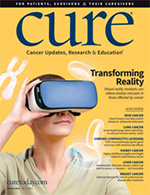General Information
Age Group
AdultsStatus
Protocol Number
Background Information
Inova’s Brain Fog Research: A research collaboration between Inova Schar Cancer Institute, Inova Neurosciences, UT Dallas Center for Brain Health, and Life with Cancer®.
Current brain fog research struggles to clearly define and measure brain fog because the changes are more subtle than typically show up on “objective” tests. These subtle changes on the tests may not appear subtle in everyday life. This disconnect can lead to people managing cancer feeling unheard or unbelieved about their experience with brain fog. However, cognitive research outside of the cancer population has developed and tested tests that are more sensitive to cognitive changes and improvements. The goal of this initial research project is to test a more sensitive test, called the Test of Strategic Learning (TOSL) and Visual Strategic Learning Test (VSLT), to see if it is sensitive enough to objectively measure brain fog.
One other problem with previous brain fog research is that it has not included a diverse population. Therefore, what we think we know about brain fog may not be true for everyone with brain fog. The diverse population in the DMV area that Inova serves deserves to have their experiences represented in the research.
The Inova research team will ask people who have had an experience of breast cancer and related changes to their cognition to complete some scales that researchers have established describe brain fog (called patient reported outcomes) and compare those results to the TOSL and VSLT results. This will be done twice to see if changes are detected similarly on both types of measures.
Why participate?
If the TOSL or VSLT is better able to detect the cognitive changes that we hear about regularly from the patients we have the honor to serve, research will be one significant step closer to being able to better study the specific causes of brain fog, so these causes can be addressed in the future. Also specific measurement will allow for better research around how to treat brain fog. While these benefits are not immediate, there can be meaning gained from helping move the knowledge forward so that all of those being treated for cancer will have the benefit of this information.
Participant's Experience
 Participation in this research can be done completely online, or participants can come to Inova Schar Cancer Institute to complete the study. Researchers will be available for questions and concerns as you move through the process. A patient advocate is also available to answer questions if you are interested in a patient perspective on this research. Participation in this research will likely take 3-4 hours of your time, over two meetings 3 months apart that are 1-2 hours each. At the completion of the study, participants will be given a $25 gift card in appreciation.
Participation in this research can be done completely online, or participants can come to Inova Schar Cancer Institute to complete the study. Researchers will be available for questions and concerns as you move through the process. A patient advocate is also available to answer questions if you are interested in a patient perspective on this research. Participation in this research will likely take 3-4 hours of your time, over two meetings 3 months apart that are 1-2 hours each. At the completion of the study, participants will be given a $25 gift card in appreciation.
Offered At
Inova Schar Cancer Institute
8081 Innovation Park Dr.
Fairfax, VA 22031
Life With Cancer®
8411 Pennell St.
Fairfax, VA 22031
Eligibility Information
- 18 years of age or older
- Patients diagnosed with or with a history of breast cancer within the last 5 years
- Life expectancy of at least 3 months
- Participant reports experiencing brain fog or cognitive impairment that the participant attributes to cancer or cancer therapy
- Able to sit for one hour and attend and respond to verbal and written instructions
- Able to use a computer
- Able to be out of bed most of the day
Ineligibility Information
- Brain metastases from breast cancer
- Severe hearing or visual impairment
- Unable to give informed consent
- Unable to read and write in English
- Those diagnosed with history of neurologic injuries or disorders (e.g. seizures, strokes, traumatic brain injury, brain surgery, neurodegenerative disorders) other than those attributable to cancer or cancer therapy
- Those diagnosed with Schizophrenia or Bipolar Disorder
Next Steps
If you feel you have brain fog and would like to contribute to what research knows about brain fog, please contact neuro-oncology@inova.org or call 202-459-3414. We are happy to answer any questions you may have. For more information on brain fog there are resources below.
What is Brain Fog (aka Chemo Brain)?
For lack of a better definition, brain fog is fuzzy thinking that is connected to an experience of cancer. Brain fog has gone by many names, including chemo brain, cancer brain, or cancer-related cognitive impairment. The term “chemo brain” implies that cognitive changes only occur following chemotherapy. Research shows that cognitive changes can follow any aspect of cancer treatment or even from the cancer itself, hence the term, brain fog. The National Cancer Institute (2018) says, "changes in memory and thinking are common in cancer patients and cancer survivors and are to be expected." While researchers know this to be true, there is still much to be learned about brain fog.
There are specific "tasks" of cognition that seem to be most affected by brain fog, these are:
 Short term memory
Short term memory- Attention
- Concentration
- Information processing speed
- The brain's ability to prioritize information and regulate emotion
For an individual brain fog often looks like trouble focusing, making it difficult to follow instructions or complete complex or multi-step tasks. This can often lead to disorganization, which increases the challenge people face. Finding the right word for everyday items or experiences may be more difficult, and there may be emotional changes, including increased frustration or loss of motivation.
These changes may impact many aspects of life. It is not uncommon for people managing cancer and brain fog to describe:
- Increased isolation
- Conflict between family members or spouse
- Decreased ability to maintain household tasks or finances
- Changes in job performance
These changes can effect emotions and mood as these cognitive changes appear to be unexplained, possibly bringing on fear, confusion, and/or shame.
If you feel you have brain fog and would like to contribute to what research knows about brain fog, please contact neuro-oncology@inova.org. We are happy to answer any questions you may have. For more information on brain fog please see the resources below.
Resources
 The National Cancer Institute maintains a web page specifically for people managing cancer and brain fog. It is updated regularly with the most recent research.
The National Cancer Institute maintains a web page specifically for people managing cancer and brain fog. It is updated regularly with the most recent research.
 CURE Magazine Article: Seeking Clarity Through Brain Fog After Cancer Treatment - April 29, 2020
CURE Magazine Article: Seeking Clarity Through Brain Fog After Cancer Treatment - April 29, 2020
Life With Cancer® Brain Fog Program
 Life with Cancer offers a four week education program on brain fog. During four weekly 1.5 hour sessions, learn the factors involved in the potential cognitive impacts of cancer and cancer treatments. You will also learn strategies that can help manage the impact on day to day functioning and develop a personalized "brain fog plan."
Life with Cancer offers a four week education program on brain fog. During four weekly 1.5 hour sessions, learn the factors involved in the potential cognitive impacts of cancer and cancer treatments. You will also learn strategies that can help manage the impact on day to day functioning and develop a personalized "brain fog plan."
Visit the Life with Cancer website where you can inquire about any upcoming brain fog programs
Learn More About How to Participate in Inova's Brain Fog Research
 Short term memory
Short term memory